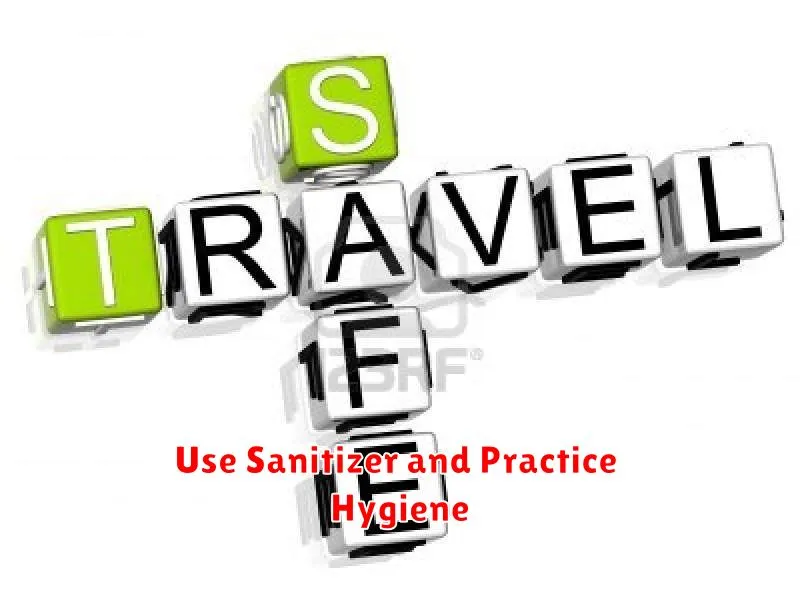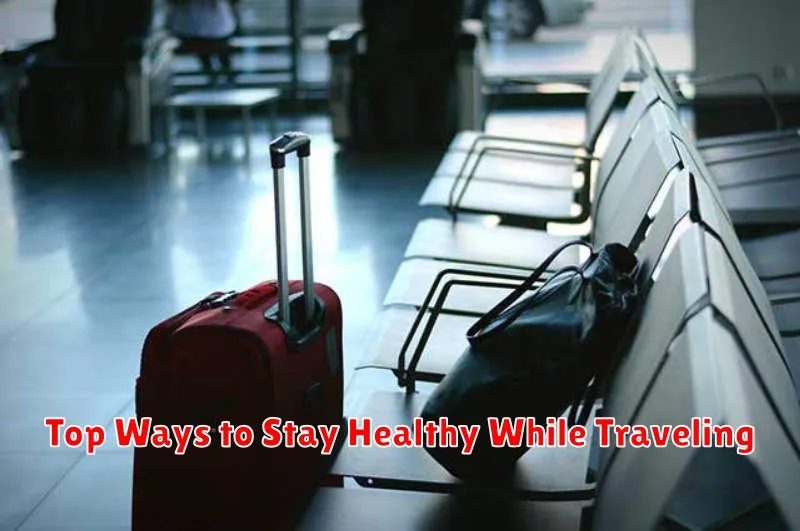Traveling can be an incredibly enriching experience, but it can also be disruptive to your health routine. Maintaining a healthy lifestyle while on the go can be challenging, with changes in diet, sleep schedules, and access to fitness facilities. However, prioritizing your well-being while traveling is essential to fully enjoy your adventures. This article will explore the top ways to stay healthy while traveling, providing practical tips and strategies to maintain your physical and mental health, no matter where your travels take you. We will cover crucial aspects of healthy travel, including maintaining a balanced diet, staying active, prioritizing sleep, managing stress, and staying hydrated. Learn how to make healthy choices on the road, from packing nutritious snacks to finding opportunities for exercise, ensuring a healthy and fulfilling travel experience.
Whether you’re a frequent flyer or an occasional adventurer, staying healthy while traveling is within your reach. Discover essential tips for staying healthy while traveling, from packing healthy snacks to staying active on the go. By implementing these strategies, you can mitigate the potential health risks associated with travel and enjoy a more energized and enjoyable journey. This guide offers practical advice on how to stay healthy while traveling, enabling you to maintain your fitness routine, eat nutritious meals, and prioritize your overall well-being while exploring new destinations. Learn how to make smart choices that will keep you feeling your best, so you can focus on creating unforgettable memories.
Hydrate and Eat Balanced Meals
Staying properly hydrated is crucial, especially when traveling. Changes in altitude, climate, and increased activity can accelerate dehydration. Carry a reusable water bottle and refill it frequently. Prioritize drinking water over sugary drinks, which can further dehydrate you.
Maintaining a balanced diet while traveling can be challenging but is essential for sustained energy and overall well-being. Try to incorporate fruits, vegetables, and lean protein into your meals. Don’t skip meals, even if your schedule is tight. Packing healthy snacks like nuts, seeds, or fruit can help bridge the gap between meals and prevent unhealthy impulse purchases.
Be mindful of portion sizes, especially when dining out. Restaurant portions can be significantly larger than standard serving sizes. Consider sharing a meal or taking leftovers back to your hotel.
Stay Active on the Road
Maintaining an active lifestyle while traveling can be challenging, but it’s crucial for overall health and well-being. Incorporating exercise can boost energy levels, improve sleep, and reduce stress, making your trip more enjoyable.
Walk whenever possible. Explore your destination on foot instead of relying on taxis or public transportation. Sightseeing becomes exercise, allowing you to experience the local culture while staying active. Choose stairs over elevators for an added calorie burn.
Pack resistance bands. These lightweight, versatile tools are perfect for in-room workouts. Resistance bands provide a full-body workout without requiring much space or equipment.
Utilize hotel gyms. Many hotels offer fitness facilities, providing an opportunity for a structured workout. Take advantage of treadmills, ellipticals, or weight machines to maintain your fitness routine. Even a short workout is better than none.
Embrace active excursions. Consider activities like hiking, biking, kayaking, or swimming. These excursions offer a fun and engaging way to explore your destination while getting exercise.
Use Sanitizer and Practice Hygiene

Maintaining diligent hygiene practices is paramount when traveling to minimize the risk of illness. Hand sanitizer, with at least 60% alcohol content, should be used frequently, especially after touching surfaces in public areas like airports, train stations, and restrooms.
Handwashing, however, remains the most effective method for eliminating germs. Wash your hands thoroughly with soap and water for at least 20 seconds, ensuring you clean between your fingers and under your nails. If soap and water aren’t readily available, hand sanitizer serves as a suitable alternative.
Beyond hand hygiene, avoid touching your face, particularly your eyes, nose, and mouth, to prevent the spread of germs. Carry disinfecting wipes to clean surfaces like airplane tray tables, hotel room remotes, and other frequently touched items.
Practicing good hygiene also extends to food safety. Opt for reputable establishments when dining out and be mindful of food handling practices. Consume thoroughly cooked foods and avoid raw or undercooked meats, seafood, and eggs. Drink bottled water where tap water safety is questionable.
Get Enough Rest Between Activities
Traveling can be physically demanding. Moving between locations, exploring new environments, and participating in various activities can quickly deplete your energy levels. Adequate rest is essential to maintain your health and enjoy your trip to the fullest.
Schedule downtime between strenuous activities. This could involve returning to your accommodation for a short nap, relaxing by the pool, or simply finding a quiet spot to sit and read. Even short periods of rest can significantly improve your energy levels and reduce fatigue.
Listen to your body’s signals. If you feel tired or overwhelmed, don’t push yourself. Take a break and allow yourself time to recover. Prioritizing rest will help you stay healthy and make the most of your travel experience.
Consider structuring your itinerary to avoid overly ambitious schedules. Packing too many activities into a single day can lead to exhaustion and increase your susceptibility to illness. Balance planned activities with periods of relaxation to ensure a more enjoyable and healthy trip.
Pack Basic Medications and Supplements
Maintaining your health while traveling requires proactive planning. One crucial step is packing a basic medical kit containing essential medications and supplements. This can help manage common ailments and prevent minor issues from escalating.
Start by packing any prescription medications. Ensure you have enough to last your entire trip, plus a few extra days in case of unforeseen delays. Keep them in their original containers, clearly labeled, and readily accessible.
In addition to prescribed medications, consider including over-the-counter remedies for common travel-related issues. Pain relievers, antidiarrheals, antihistamines, motion sickness medication, and indigestion relief can prove invaluable.
If you regularly take supplements, pack enough for the duration of your trip. This will help maintain your usual health regimen and avoid any disruptions to your well-being.
Finally, don’t forget essential first-aid supplies. Band-aids, antiseptic wipes, and a small tube of antibiotic ointment can address minor cuts and scrapes.
Stay Up-to-Date on Vaccinations
Prior to embarking on international travel, it is crucial to ensure your vaccinations are current. Consult with your physician or a travel health specialist well in advance of your trip. They can advise you on recommended and required vaccinations based on your destination and personal health history.
Some vaccinations may require multiple doses or a certain timeframe to become fully effective, so planning ahead is essential. This proactive step can protect you from preventable illnesses and ensure a healthy and enjoyable travel experience.
Routine vaccinations, such as those for measles, mumps, rubella, and influenza, should be up-to-date. Additionally, certain destinations may require or recommend specific vaccinations depending on the region’s prevalent health risks. These might include typhoid, yellow fever, or hepatitis A and B.
Carry a record of your vaccinations with you while traveling. This provides valuable documentation should any health concerns arise during your trip.
Know Where to Seek Help If Sick
Falling ill while traveling can be disruptive and stressful. Being prepared and knowing where to find medical assistance is crucial. Before your trip, research local medical facilities near your accommodations. Note the locations of hospitals, clinics, and pharmacies.
Your hotel or accommodation staff can often provide recommendations and contact information for local doctors or medical services. Don’t hesitate to reach out to them for assistance. They can be invaluable resources in navigating the local healthcare system.
If your condition is serious, immediately seek emergency medical care. Depending on your location and the severity of your illness, this may involve calling an ambulance or going directly to a hospital emergency room. Familiarize yourself with the local emergency number before your trip.
Travel insurance is strongly recommended. A comprehensive policy can cover medical expenses, emergency evacuations, and other unforeseen circumstances. Ensure you understand the terms and conditions of your policy before traveling.
Pack a basic first-aid kit with essential medications for common ailments like headaches, upset stomachs, and allergies. Keep a copy of your prescriptions and any relevant medical documents easily accessible.

